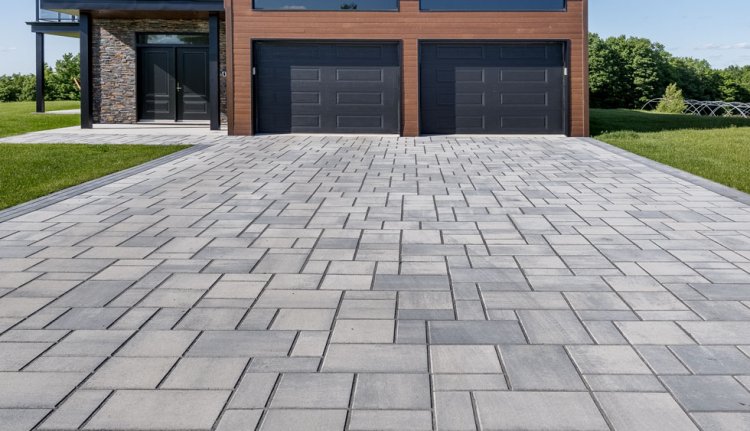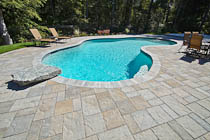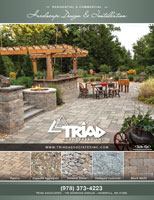 When you’re ready to dress up your home’s exterior and put in some hardscaping, you might be excited to dive right into the fun stuff, like picking out the type of stone you want or choosing sophisticated accent features like lighting. However, you’ll also need to spend some time planning out the less exciting elements of your project that will have a huge impact on its long-term functionality and success. If you are planning a paver project, such as a patio or driveway, one of those dull but important details is paver thickness.
When you’re ready to dress up your home’s exterior and put in some hardscaping, you might be excited to dive right into the fun stuff, like picking out the type of stone you want or choosing sophisticated accent features like lighting. However, you’ll also need to spend some time planning out the less exciting elements of your project that will have a huge impact on its long-term functionality and success. If you are planning a paver project, such as a patio or driveway, one of those dull but important details is paver thickness.
Why is Paver Thickness Important?
Hardscaping is an investment. Not only do you want your project to look great, but you want it to last a long time. It’s not an investment you want to have to keep making over and over again. That’s where the importance of paver thickness comes in. If you don’t have the appropriate thickness for your pavers, you risk damage to the hardscape. Some damage can be repaired, but you are likely to find that if the pavers are not the appropriate thickness, you will have recurring damage and, ultimately, the hardscape will have to be replaced. The right paver thickness will help to protect the hardscape against damage and lengthen its lifespan, saving you a lot of money in the long run.
Different Paver Thickness Sizes
There are a wide variety of pavers available for hardscaping, and they come in different thicknesses. The thinnest pavers will usually be around 30-40 mm, or about 1-1/5 to about 1-3/5. The thickest pavers are typically 80 mm, or about 3-3/20. Knowing what thickness of paver you need will help you focus your search when you are trying to decide on aesthetics like the color, texture, and shape of the pavers.
Factors That Influence the Choice of Paver Thickness
The best way to plan your paver project is to work with an experienced and talented hardscaping specialist like those at Triad Associates. Your hardscaping contractor can help you through each step of the design, including selecting the right thickness for the project. These are some of the things that your contractor will consider when determining the appropriate thickness for the pavers:
Usage and Weight Capacity
One of the most important considerations for paver thickness is how the area will be used. For example, if you are building a patio that will only be exposed to foot traffic, thinner pavers will serve just fine. However, if you are building a driveway that will serve heavy vehicles, you’ll need the thickest, 80 mm pavers.
Climate and Environmental Considerations
 Extreme weather conditions can take their toll on hardscaping materials. In Haverhill, MA, residents experience very cold winters with ice. Pavers, concrete, and other hardscaping materials can all crack in these conditions. You’ll need to consider thicker pavers that can better withstand these conditions. Talk with your contractor about other environmental considerations that could influence your pavers.
Extreme weather conditions can take their toll on hardscaping materials. In Haverhill, MA, residents experience very cold winters with ice. Pavers, concrete, and other hardscaping materials can all crack in these conditions. You’ll need to consider thicker pavers that can better withstand these conditions. Talk with your contractor about other environmental considerations that could influence your pavers.
Base Material
Pavers are laid over a base material, such as sand, gravel, or even a concrete slab. How much support the base material offers will have an impact on the thickness needed for the pavers. For example, a solid base like concrete will provide much greater support and can protect thin pavers even under heavy traffic.
Style and Aesthetic Preferences
The thickness of the pavers can affect the look of the pavers or the overall style of the project. The hardscaping designers at Triad Associates can help you visualize your options and explore the way that different paver thicknesses affect the style of your project through the use of 3D design software.
Paver Material
Not all paver materials will be available in all thicknesses. If you have your heart set on a certain material, you might be limited by the options for thickness. Make sure you talk through your options by thickness and type with your contractor. There are so many great paver options that you can certainly find something that will give you the look you want while also providing the thickness that your project needs.
Ideal Paver Thickness for Different Projects
As noted, the type of project that you intend to install will have a big impact on what thickness you need for your pavers. Here’s a breakdown of the ideal paver thickness for some common hardscaping projects you may be considering:
Patios
Patios are great for relaxing on weekends or gathering with friends and family. You can use a thinner paver for patios, but you still need some good thickness to deal with potentially heavy foot traffic of heavy furniture like couches or grilles. Typically, 50 mm is enough for patio pavers.
Courtyards
 Courtyards are larger paved areas that are designed for large groups. Typically, you would see a courtyard in a commercial property, but they can also be installed on larger residential plots. Courtyard pavers should be 60 mm or more. If you are planning to add large accessories to the courtyard, you may need to choose a thicker paver. Consult with your hardscaping contractor for guidance.
Courtyards are larger paved areas that are designed for large groups. Typically, you would see a courtyard in a commercial property, but they can also be installed on larger residential plots. Courtyard pavers should be 60 mm or more. If you are planning to add large accessories to the courtyard, you may need to choose a thicker paver. Consult with your hardscaping contractor for guidance.
Fire Pits
If you are going to build a fire pit, you’ll need a base of about four to six inches, depending on how frequently the fire pit will be used and how large it is. Your hardscaping contractor can provide the right guidance for your specific project.
Driveways and Parking Lots
Driveways and parking lots will need the thickest pavers to withstand the vehicular traffic that they will get. Typically, 80 mm paver thickness is the right choice for these pavers, though you may need even thicker if you expect commercial or industrial vehicles.
Walkways
Unless you are installing an especially large walkway with a lot of pedestrian traffic, you can use 40 mm thick pavers for your walkways. The thinner paver has a wider variety of options, giving you greater design flexibility, as well.
Pool Decks
Typically, 60 mm thick pavers are used for pool decks, providing the right support for all the foot traffic. Be sure you also choose pavers that have texture and other qualities to reduce slip. Consult with your contractor to select the right thickness and the right materials for your particular pool design and the anticipated traffic.
Rooftops
Some flat rooftops provide the perfect place to install a seating or gathering area. You can use thinner pavers – 30-40 mm thick – for these patios since they won’t get much foot traffic. The thinner pavers will also place less burden on the roof material, ensuring long-term success.
Mistakes to Avoid While Choosing the Right Thickness
Choosing the wrong thickness for your patios can end up costing you a lot of money in repairs and damages to nearby elements, as well as potentially causing safety issues. Be sure to avoid these mistakes when choosing the thickness for your pavers:
Wrong Load and Usage Assessment
The weight load that an area will get is critical to determining the right paver thickness. If you miscalculate the load or you underestimate how much the area will be used, you could end up choosing the wrong pavers for the project.
Prioritizing Aesthetics Over Needs
Most people focus on how their hardscaping will look when it’s done. They are less interested in the engineering behind how well it will work. If you prioritize aesthetics over the needs of the space, you could choose the wrong pavers for your project and face big consequences.
Overlooking Long-Term Needs
Some pavers may work well in the short-term, but they may not stand up to long-term exposure to the elements and to heavy usage. You need to think about the long-term needs of a space to create a successful project. Seek the advice of your contractor to choose wisely.
Material and Thickness Mismatch

Pavers
Not all paver materials work in all thicknesses. Some materials may be less durable, making the thickness less reliable. Some materials can be stronger even at thinner thicknesses. Work with your contractor to choose a material that will provide the durability and the thickness you need.
Neglecting Professional Advice
Your contractor should be a qualified and experienced professional. If they give you guidance on a project, you should listen to it. Their opinion comes from years of work that has shown them what will be successful and what won’t. If you ignore that hard-won advice, you are doing so at your own peril.
Work with Triad Associates’ Paver Experts Today
The paver experts at Triad Associates have been installing paver projects throughout the Haverhill, MA, area for several decades. We have earned a reputation as some of the best paver contractors in the area, thanks to our exceptional service and workmanship. Our paver projects look beautiful, and they last decades. Call us today to schedule a consultation with one of our paver experts to start talking about your next project. We can design a new paver walkway, patio, driveway, or other surface, or we can redesign your current space. Let us transform your space!




